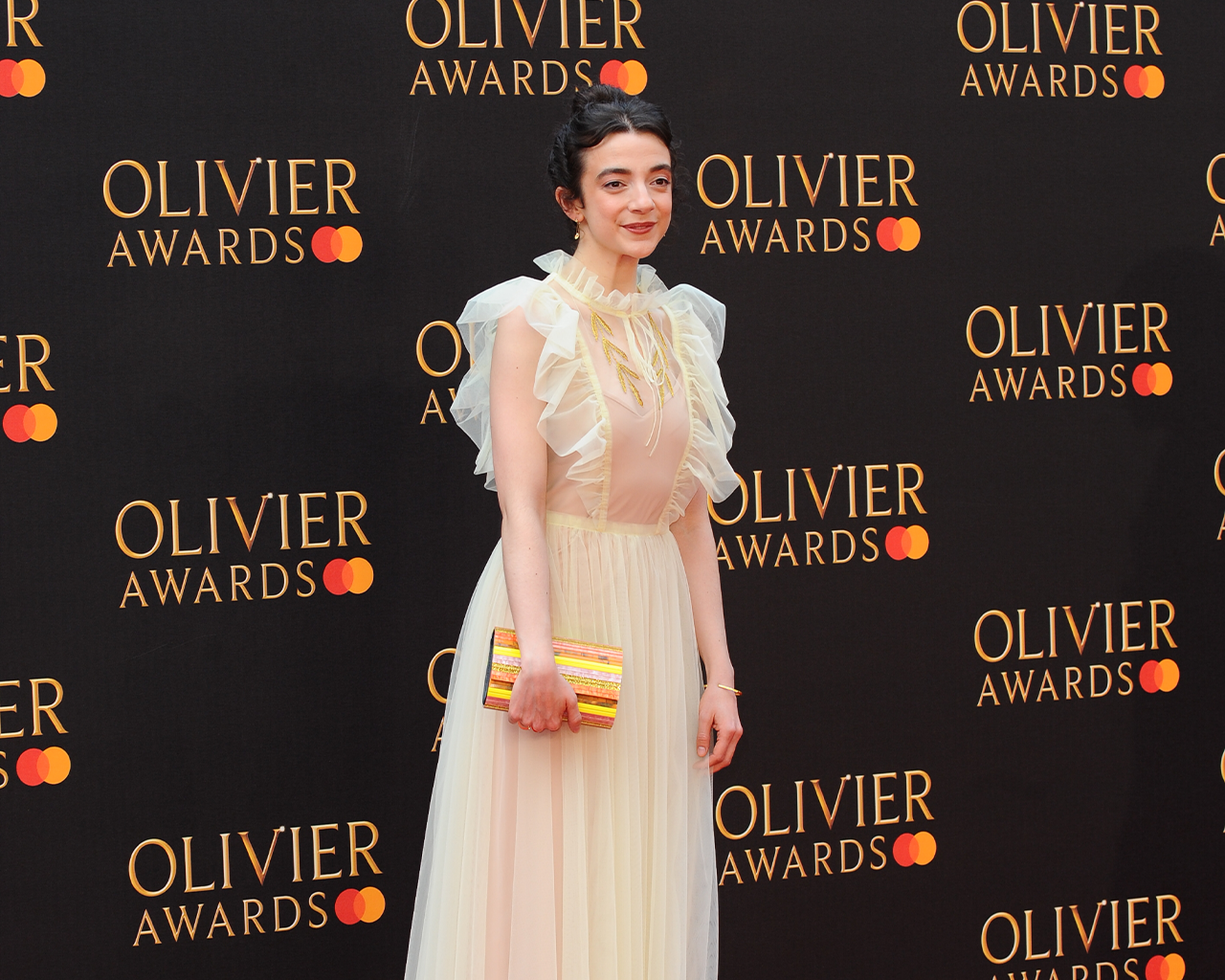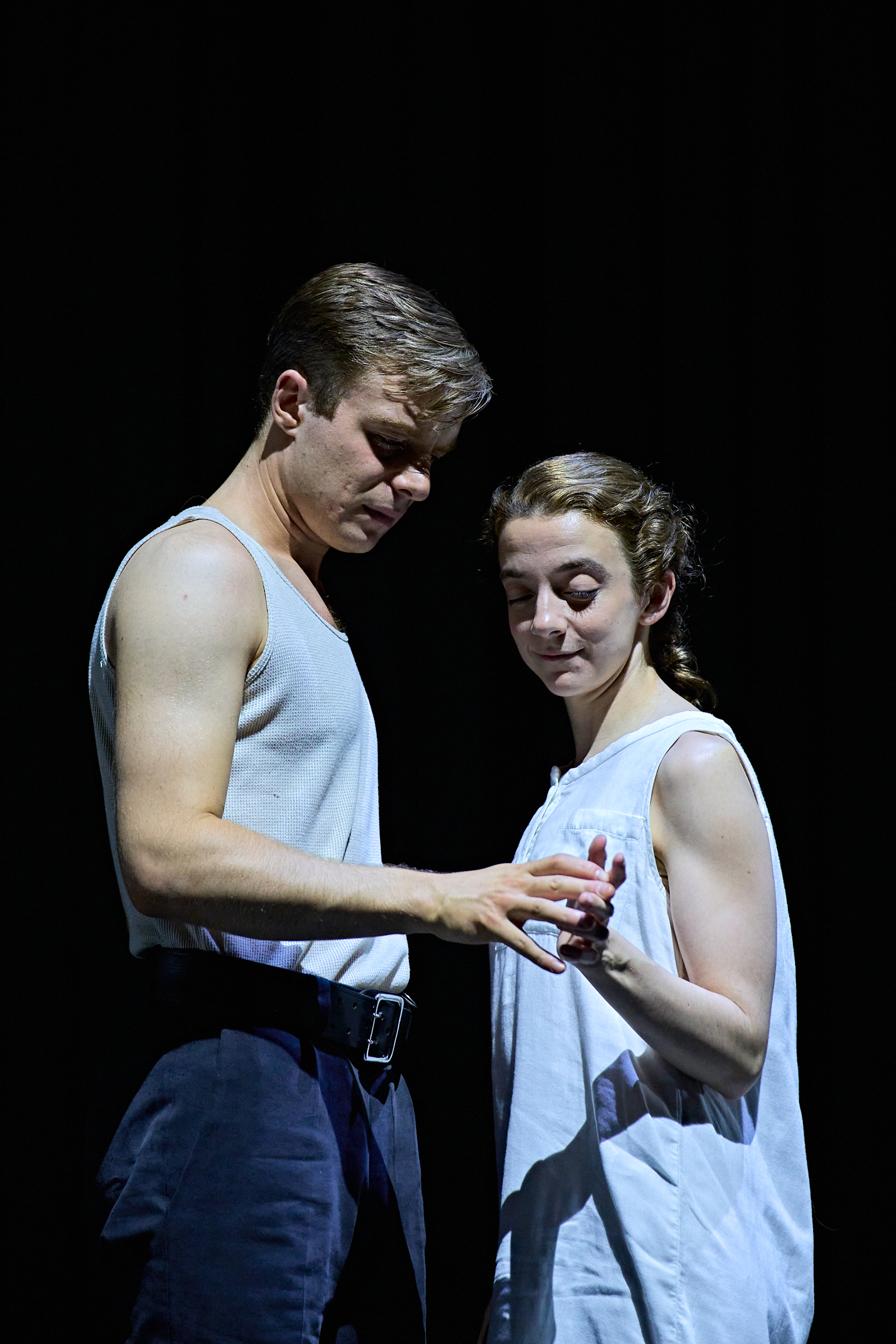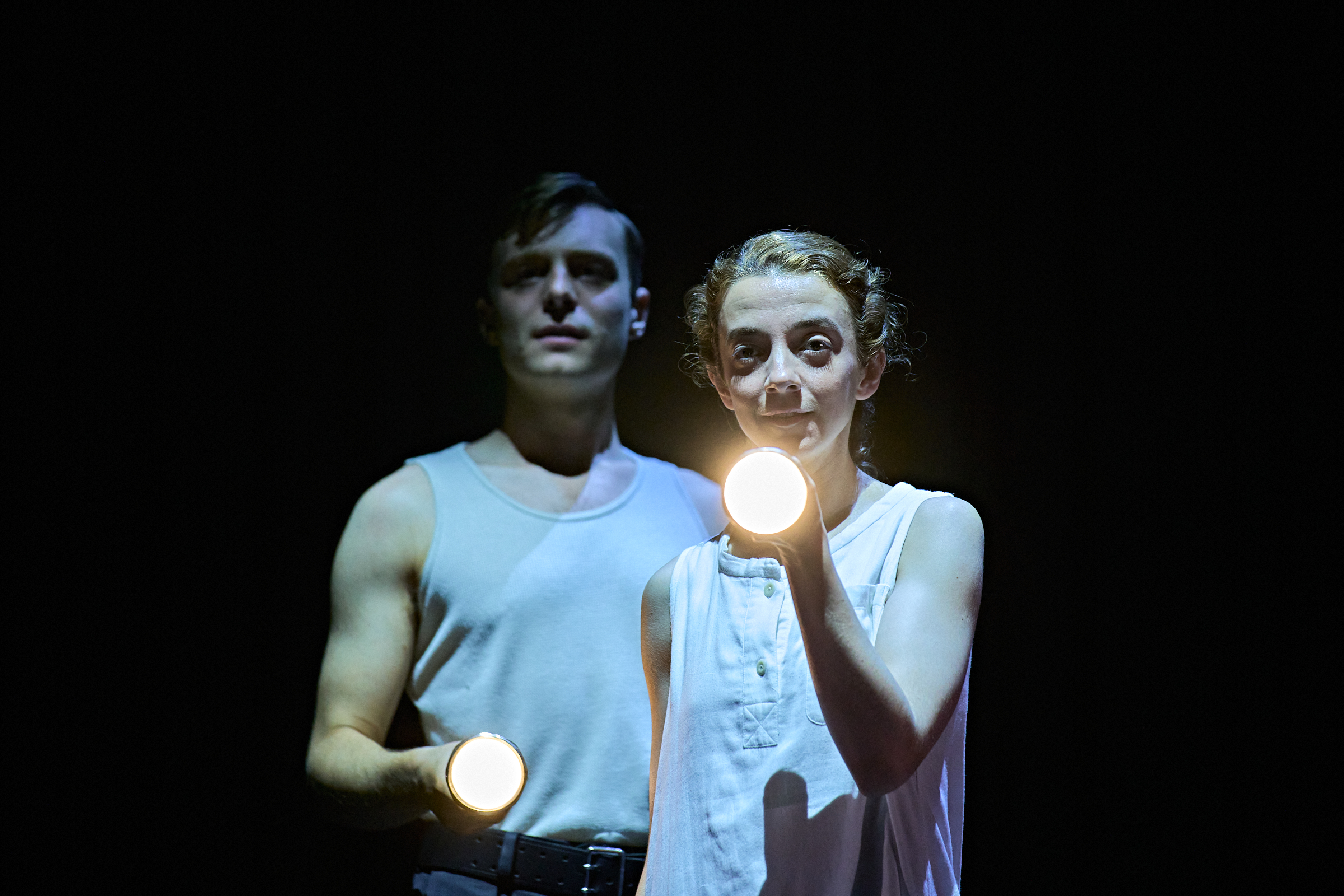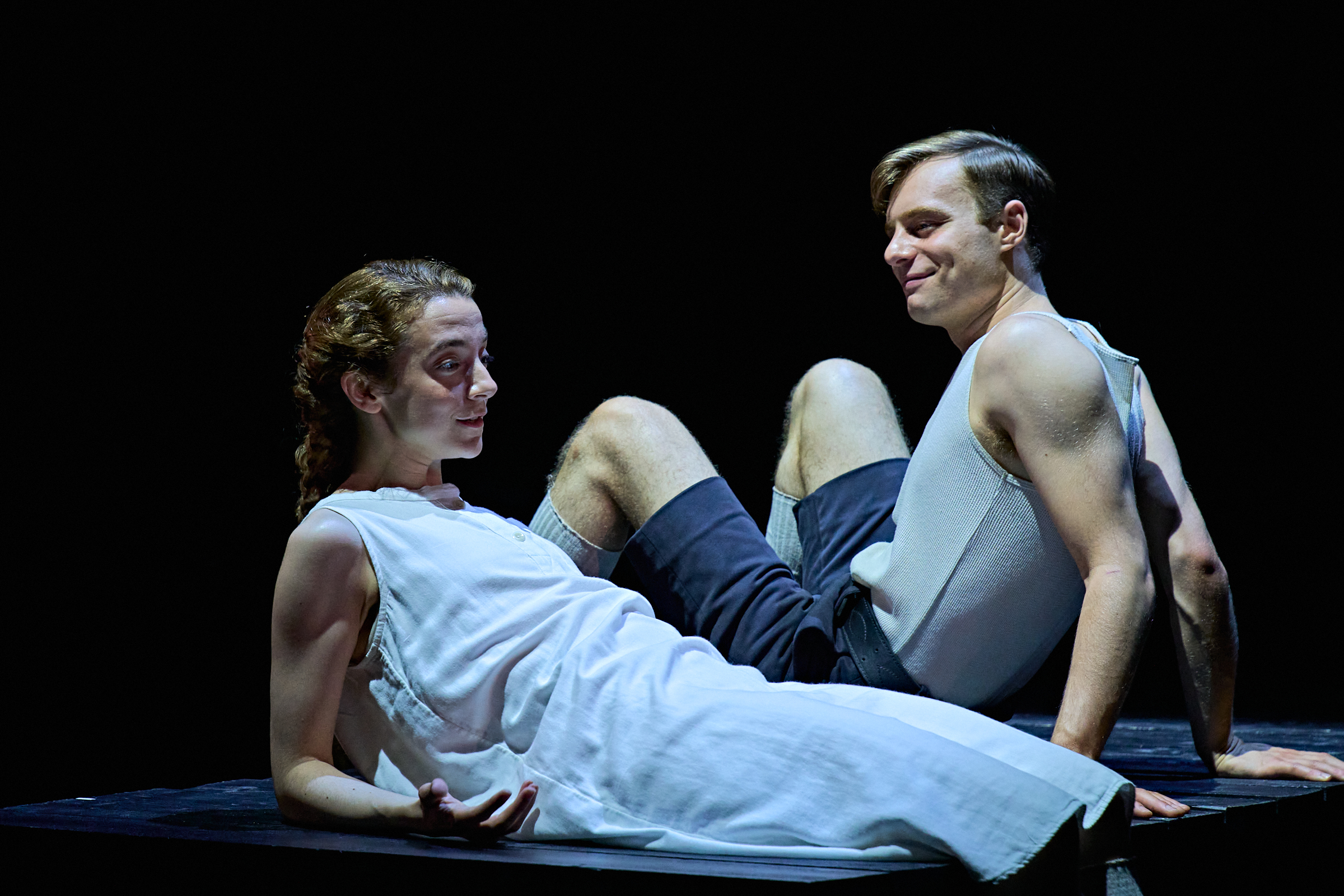

Patsy Ferran, a British actress of Spanish descent, is a singular talent. Even her beauty is a one-off, as they say over here in London where I am right now seeing lots of theatre, which has included her brilliant performance as the needy German American 1930s teenager fumbling about at a summer camp where she and others longing for any form of seduction find their inchoate longing curdled into indoctrination in Bess Wohl’s two-hander Camp Siegfried at the Old Vic. It is based on a very real camp on Long Island where German American families sent their children to learn all about Nazism. Wohl and Ferran and her co-star Luke Thallon try to comprehend such a place and its results and ask the question: Can fascism be hormonal? It speaks to their distinctive talents and how they have been meshed by director Katy Rudd with her own that they make us believe that indoctrination into such an evil possibly might be as it springs from misplaced longing right before our eyes. It is unsettling and disquieting as we are confronted with the neediness of very young, very American Nazis.
Ferran won an Olivier Award in 2019 for her portrayal of Alma in Tennessee William’s Summer and Smoke on the West End in a production that originated at the Almeida. It was directed by Rebecca Frecknall who is now directing the production of Cabaret about to open on the West End with Jessie Buckley as Sally Bowles and Eddie Redmayne as the Emcee. Ferran is also in the current film Mothering Sunday directed by Eva Husson as the fellow-maid of the lead character played by Odessa Young, and she steals all their scenes.
Here is The Guardian’s critic Susannah Clapp writing about Ferran back in 2014 when the young actress was starring in the National Theatre’s production of Treasure Island in which the character of Jim had been transposed by the adapter of Robert Louis Stevenson’s classic, Bryony Lavery, into Jemima. “The absolute marvel is Patsy Ferran. I’m not surprised she is proving herself mighty; I am only pleased she has managed it so quickly,” wrote Clapp. “Ferran made her stage debut as a scene-stealing comic maid in Blithe Spirit only in the spring. This autumn she was extraordinarily subtle – melancholy and obsessive – in James Graham’s The Angry Brigade at Plymouth. She brings these qualities to Treasure Island, where her mixture of wistfulness and sprightliness and her light-as-a-feather movement makes her sometimes look like a tiny Charlie Chaplin. Wit comes not only out of her mouth but of her elbow. She is one of the best young actors I have seen in the past decade.”

Before the pandemic shutdown, Patsy, you were about to open in Who’s Afraid of Virginia Woolf? on Broadway. You were playing Honey in a cast that included Laurie Metcalf as Martha and Rupert Everett as George and Russell Tovey as your husband Nick. Then you were shut down here in London because of the pandemic when you were doing a production of A Christmas Carol at The Bridge Theatre. That must have been so frustrating. I’m glad you are finally back on a stage. You are remarkable in Camp Siegfried at the Old Vic. It teeters on being a romcom about fascism but keeps its precarious, frightening balance as do you and Luke in the play thanks to Katy’s direction and Bess’s brilliance as a writer. You even have a Hitler-like speech in the middle of the play that is both harrowing and heartbreaking even though you are rather Hitlerian in your affect. What drew you to such a play?
I was unfamiliar with Bess’s work. What happened was I was in the middle of the second or third lockdown. I can’t even remember now. Time has become sort of this wishy-washy thing. The play was sent to me by Katy and at that time I had made this quiet decision in my head that I was going to leave theatre for a bit because of those experiences you mentioned. I just thought maybe I should leave it alone and at the time filming was booming here in London. So my agent was thrilled.
I remember thinking I’d read Camp Siegfried for courtesy’s sake but I just assumed I was going to pass. But then I read it and it was one of the best things I’d read in years. Bess has this amazing ability of dealing with hard-hitting global issues in the prism of the personal space – which is my favorite type of theatre so you never quite experience the message of the play as being hit over the head with it. It’s character-led which is the best type of theatre. For actors, it’s catnip. I had a meeting with Katy right away on Zoom and told her that I had a plan not to do any theatre for a bit. And I’m a planner, by the way. I don’t like change of plans initially. But it has been one of my favorite theatre experiences I’ve ever had. Thanks to Bess. She is sort of borderline genius. I know that is a strong thing to say. But her changes during rehearsal and her thought process have such a lightness of touch. You never feel like it’s hard work.
When I was working on that speech you mentioned, I focused more on Charlie Chaplin’s The Great Dictator and his interpretation of Hitler. I really respond to physical comedy and maybe I’ve absorbed that a little bit and unconsciously used that in my own work. I don’t think of myself as articulate or 100% safe with the words I use. Because when I say what I’m about to say, I then question if I really even believe it. But with my body, I have more confidence. But that’s all just an aside.

By having watched The Great Dictator, I sort of knew the parody version of it. Then I did watch this one clip of Hitler on YouTube right before we were about to rehearse the speech. And then we watched some of the climate activist Greta Thunberg – actually more than once. She has that how-dare-you speech. Those two people obviously have two very different ideologies but when they preach their ideologies and what they believe in, it comes from a very personal place. It doesn’t sound like political rhetoric – even with Hitler that one time I watched him. He says things like, “I have sacrificed so much of myself for you.” Everything felt personal and I think that was why he was so effective. A lot of the politicians I listen to – especially in this country – feel a bit detached from reality. So when they claim certain things there is a kind of disconnect with their own personal emotions when they speak so I don’t believe them. But whereas with him and with her, they just unlocked something for me.
I didn’t practice movements or anything. I just try to make everything I say in that speech personal. Greta believes everything she says. So I have to force my brain to believe that what I am saying in that speech in that moment is 100% true. It is both scary and exciting for the character. In life I am quite timid and similar in that way to this character in the play. I’m scared of everything. I’m quite timid. But to be given the opportunity that is 360 degrees different than my own personality and just to let rip feels in that moment quite good.
You went to Mississippi to research your role as Alma in Summer and Smoke. I’m from Mississippi. Let’s bond a bit. What was your experience there?
Okay. So I’m in love with America. There is just something about the country. When I got cast to do that Tennessee Williams play I had a couple of months off before I started rehearsals. And I used that as an excuse to go on holiday with my dad and do a Tennessee Williams pilgrimage. We started in Columbus, Mississippi, where he was born. Then we went to Clarksdale where there is a Tennessee Williams Park. It was all amazing.
I used it initially as an excuse to go on holiday but, in fact, it unlocked so much for me about that play. I am sort of in love with the people of Mississippi. There is something about their graciousness and “the taking of a room.” That’s what really helped – especially when you’re doing American plays – there’s no second guessing when you start to speak. You just start to speak and you take up room. And you understand why, especially in Tennessee Williams, that people speak for so long.
I’m in love with that part of the world. My dad and I went into a coffee shop in Clarksdale, Mississippi, along the High Street. They had an old cinema from the 1950s or 1960s that was boarded up. However there was this one coffee shop which felt like the hub of the place. We ended up going there for breakfast. It’s a tiny town. So when we turned up people were like who-are-these-people. During breakfast I caught eyes with a group of older men who obviously have a daily get-together there in the coffee shop. This one man caught my eye and he just started speaking to me. He asked where we were from and we told him we were from London. And he said, “Wai-uhl, wailcum to Clarksdai-uhl” and gave us the big neighborhood welcome sort of thing. At one point the man pointed over at his friend and said, “This heuh, is the District Conmmisionah. If you want anythin’ a’tall, you just let us know.” I said, “Thanks very much, sir.” That would just never happen here in London. There was just this sort of ease and confidence and charm. I’m sure it was a bit performative But it was amazing. An amazing trip. We ended up in New Orleans.

Everybody does at some point. As for Tennessee being from Mississippi, I always say we might not can read in Mississippi but we sure as hell can write. During the lockdown you read the novel Weather by Jenny Offill. In it she writes: “When electricity was first introduced to homes, there were letters to the newspapers about how it would undermine family togetherness. Now there would be no need to gather around a shared hearth, people fretted. In 1903, a famous psychologist worried that young people would lose their connection to dusk and its contemplative moments.” How do you settle in to your own contemplative moments?
For me my meditative or contemplative state comes though reading. Because to me screens are problematic. For me, my phone robs me of any form of contemplation. Screens shut down my brain. I almost become a zombie in front of any screen. I am jealous of people who can watch things on television and be active. I become passive and not in a good way. So for me, I spend an hour every morning with my coffee reading. And if I have the day off, I carve out the time to read. It makes my brain active and feels personal to me and I make notes. I don’t keep a journal but I’ve turned to books since I was twelve.
And then on the other side to unwind sometimes – I am constantly and pragmatically thinking of what I need to do next – I need something to help me shut off. So a show like Selling Sunset – one of my favorites – did that for me when I found it.
Oh, I want to put this out in the universe while we’re at it. I love the writer Stephen Adly Guirgis. I hoping my Spanish roots can help me one day find myself in his world. I am also one not to ask for too much. So I am prepared for him to go, “No, no no …” But look at what I’m reading right now. [She reaches up to a book shelf to retrieve copies of his plays Our Lady of 125th Street and Den of Thieves.] I’d love just to chat with him.
In Treasure Island there is a beautiful moment when Long John Silver is showing your character Jim – well, Jem, I guess – the stars in the sky and points to Polaris, the North Star, and says it is the “one constant immovable star.” Jem then quietly says, “Like my Grandma.” What was your grandma like?
My mum’s mom – we called her Yaya – was small, delicate. I have her hands. She was immaculate always. She had seven children. But there was a formidableness to her. She was tough. We adored her. We didn’t live in Spain so we only got to see her twice a year. She was the tough grandma. Then my dad’s mom – Amatxi, which is the Basque word for grandma – she was interestingly quite a formidable mother but when it came to being a grandmother she was the most loving and caring and became as soft as butter. We couldn’t do any wrong. So a lot of love there.
They both passed away. They did see me in school plays. I went to an all-girls schools and they saw me play Lt. Brannigan in the musical Guys and Dolls. I was 16. They didn’t speak a word of English so they didn’t know what was happening. But I remember seeing my granddad’s face afterward and he had watery eyes. I was shocked by that because he was very serious – a doctor.
Every now and then I bring them onstage with me. That’s no lie. I have moments when I feel my grandparents energy just behind me. It’s very emotional.
To get back to Alma in Summer and Smoke, she says at one point in the play, “Oh, I suppose I am sick, one of those weak and divided people who slip like shadows among you solid strong ones. But sometimes, out of necessity, we shadowy people take on a strength of our own.” You have also played Portia in The Merchant of Venice with the Royal Shakespeare Company. Portia in Act One, Scene 2, says, “He will fence with his own shadow.” Is acting a shadowy art as you fence with your shadow self?
I’ve never thought of it that way. But those lines have always resonated with me as someone who always takes the backseat and someone who doesn’t always feel the need to exert my existence in a room – which does mean that sometimes people can take advantage. Or people can forget you’re even there as they just assume you’re going to go along with whatever rules have been decided on within that space.
But for me it also means don’t underestimate the quiet ones, the ones who sort of seem to slip in and out of the space. Because, in fact, we’re always observing. We’re always watching and learning. Those are the people who pick their moments. So with Alma she picks her moment to find that inner strength and go, “I exist. I’m here. And I’m worthy.”
Alma is very similar to my character in Camp Siegfried in that way – the divided person who doesn’t quite know who she’s supposed to be in this world. And yet the person she feels she is, the society into which she is born doesn’t accept it. She is constantly trying to shift and change in order to fit in when, in fact, she has this dark edge and this power and passion that this particular summer camp allows her to exercise.
But in terms of acting, yes. You are constantly shape-shifting. I do think however the more I do this job, you do shape-shift but it’s always rooted in you and your core. So whoever you are, you have so many versions and faces and shapes in your soul and in your being – and you just have to access that part of yourself in order to do a certain job as an actor. It was tricky this time in this job in Camp Siegfried because I learned that Americans think differently than British people. In terms of speed of thinking, Americans can just start speaking without really knowing what they are about to say. There is just this front-footedness. This is a huge generalization. I realize that. But it was explained to me this way for me to unlock the character in Camp Siegfried in particular. British people think … and then talk.







